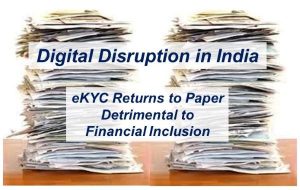India is now officially the first country to roll out video-KYC for financial institutions
The Reserve Bank of India (RBI) has approved remote video-based authentication through Aadhaar as a substitute for e-KYC practices, following last year’s proposal listed in a report of the Expert Committee on Micro, Small and Medium Enterprises, headed by UK Sinha, former chairman of the Securities and Exchange Board of India (Sebi), writes Business Standard.
RBI has updated its regulations under the Prevention of Money-laundering (Maintenance of Records) Rules, 2005. The amendment can be reviewed here.
At the time, the committee noticed individuals’ physical presence was necessary for e-KYC which involved operating with a high amount of data. But in the case of a Video Customer Identification Process (V-CIP), the process is simplified thanks to a video chat option that lets the customer show documents. Video-KYC is recommended with Google Duo or Apple FaceTime.
RBI assures customers that video-KYC will ask for their consent to establish identity and for onboarding. Customers will either have to show the PAN card or provide an e-PAN themselves, which will be double checked with the issuing authority.
Experts, on the other hand, believe RBI would not agree to third-party applications, because under the data protection Bill, the central bank will not allow companies to store customer data in external locations. For now, RBI did not release information on which app will be used for video chat, but chances are a proprietary app will be introduced.
India is now officially the first country to roll out video-KYC for financial institutions, according to Pragativadi.
According to Veri5Digital, a 40 percent plunge was noticed in new customer acquisition when some sectors such as fintech went back to manual verification.  Offline Aadhaar-based verification came with its drawbacks. Veri5Digital has come up with Video-based customer KYC solutions to help with the situation. Following RBI’s amendment and approval for video-KYC, BFSI sector can now leverage machine learning and Artificial Intelligence for customer onboarding, ensuring full compliance.
Offline Aadhaar-based verification came with its drawbacks. Veri5Digital has come up with Video-based customer KYC solutions to help with the situation. Following RBI’s amendment and approval for video-KYC, BFSI sector can now leverage machine learning and Artificial Intelligence for customer onboarding, ensuring full compliance.
Updates include customers now using video-KYC for video calls with RE officials, the use of both physical and electronic versions of documents for KYC, an agent no longer having to meet with the customer for IPV as the VCIP and DSA (direct selling agent) can assist. While biometric facial recognition and AI/ML-driven technologies will be deployed, recorded live video will still be mandatory, as will be customer consent. To be accepted for KYC, offline Aadhhar XML or secure QR have to be no more than three days old. To ensure integrity, the data submitted is saved along with details about location to ensure customers are in India, timestamp, identity of RE official conducting the call and identity details of BC (Business Correspondents) assisting the customer.
Source: Biometricupdate.com
BIIA Editorial Comment: As we pointed out in earlier comments, the Supreme Court edict to return to manual identification methods was not working and was retarding efforts to enhance financial inclusion for individuals and businesses.


























